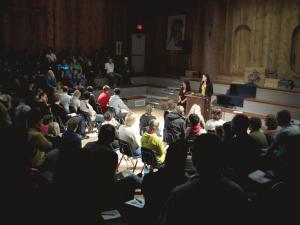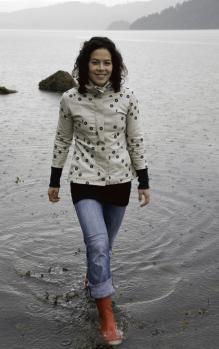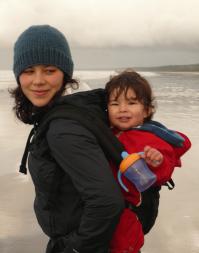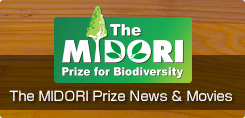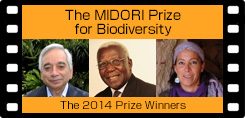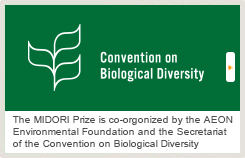Respecting our food, respecting biodiversity
- Severn Cullis-Suzuki
- Culture and Environment Activist and Writer
Biodiversity is a driver for evolution. It ensures survival, and the resilience of ecosystems in the face of disaster. It is something without which humans, at the top of the food chain, cannot survive. Yet this reality is denied in our collective priorities: our entire globalized economy and current paradigm has led to today, where we are witnessing a mass extinction, the sixth in the history of Life on Earth. We are only beginning to feel the repercussions of this.
This extinction event may be the biggest influence on the future of humanity. However we do not think about this yet in our daily lives. In fact, we are in this pickle largely because cause and effect have been decoupled in our current economy. We do not see the connections between ourselves and the natural world, even though since the dawn of humanity this connection has been so clearly necessary. Today we buy mass produced, sterilized food in packages at giant, chain grocery stores. Where meat comes in slices, eggs come clean and white in Styrofoam cartons, and where foods scarcely look as if they came from the dirt, or from a living animal. Children who live in cities do not even know that milk comes from a living, mooing, mammal. It is no surprise, therefore, that maintaining biodiversity is not important to us. We cannot see the connection between our lives and Life because we have been so fragmented from it.
How can we ensure biodiversity on the globe? We must become more in touch with our biological reality. We must recall that we, as individuals and as humans, are members of the animal kingdom, and depend on healthy ecosystems for each breath, each drink, and each morsel of food that sustains us. Besides water and salt, everything that we consume was once alive. And I believe that one way to reconnect this reality, is by growing and killing your own food. These two acts are acts of rebellion in a fragmented and globalized mainstream food economy that encourages us to practically deny that plants grow from the earth, and that creatures must die for us to live. We must witness their growth and their death to pay the respect that is due, and recognize our responsibility.
I have always lived in a home with a garden, growing some of our food. But I have recently begun living in a place where all the seafood and meat that I eat has been hunted and gathered myself and my family. Six years ago I moved to my husband’s community - a native village on the archipelago of Haida Gwaii. It has been at once a humbling and empowering education. In springtime we catch halibut with long lines with hooks, and then sockeye in nets when they come upriver to spawn. In summer we catch Chinook and coho salmon with rods. On the lowest tides we spear sea urchins, and pry rock scallops off the rocks. In fall my husband hunts for deer, and in winter we dig razor and butter clams, and hunt geese and ducks. And sometimes we spear octopus.
We only take as much as we can deal with; it is a lot of work to prepare the food so that we can live off it for the rest of the year. Therefore we never take too much, and although there is not the abundance of a hundred years ago, there is always plenty for everyone in our community. While the community is far from rich in money, our food abundance here on Haida Gwaii makes us amongst the wealthiest of peoples. The experience of harvesting and killing your own food is a transformational one, and one that teaches you to honour Life and take your responsibilities as a human seriously.
I remember the first time I was taken octopus hunting. It was before I was married, and my husband-to-be, Judson, took me to spear octopus, one dark night when the tide was low enough. The times for this set of low tides had been marked on my calendar for weeks; I was so excited. I was fascinated by everything, and watched my partner intently, someone who had grown up hunting octopus, someone in harmony with the land of his ancestors. At his parents’ home there is a photo of 13 year-old Judson with his grandfather, Gaahlaay, taken some 22 years ago. In the picture he can barely lift a huge octopus that they have caught. His grandfather is smiling, so proud.
Before my eyes I watched my partner become a hunter. Judson’s excitement became obvious as the truck got near the right beach. He sat straight, his body becoming alert. We got out of our vehicle and he took off down the beach. I had to scramble to catch up. The beach was dark, we couldn’t see the full moon behind the clouds.
I can’t give away the secrets of how you catch an octopus. But you have to have the right low tide. And you have to find the right beach on Haida Gwaii, having proper ratios of tidepools to small boulders. You have to have the right equipment, including headlamps and a stick and boots and warm clothes. Then you have to find the den, its telltale signs visible only to the trained eye. How do you catch an octopus? Wherever you are in the world, you have to be with someone who knows what they are doing. Someone who learned from someone else. Judson inquired at each potential den, and we waited for the answer to the knock at the door.
There was another light further down the beach. We approached it, and Judson recognized a fellow hunter. He was waiting for the octopus under the rock he was next to. We waited with him. I was so anxious to see the elusive creature! We waited. Waited. Then Judson found a back entrance to the den and the men began coaxing the animal to exit. I try to keep my headlamp glare away from the front door.
We were about to give up, but suddenly the octopus came shooting out from the den’s front entrance! Our friend grabbed it and pulled it from the water.
The animal was magnificent. It about a meter across, and dark red. I couldn’t help my exclamations, loud in the calm night. Its eight arms were writhing and grasping and reaching, hoping to maneuver an escape. We all watched in admiration at its great arms, its large, bulbous head, its giant suckers that pop when you pull them off your fingers. He was so strong. So beautiful.
Then, we had to kill it. Judson found a good rock and gave it to our friend, who smashed the octopus’ head between the eyes. I whispered a prayer of thanks to the beautiful creature. The arms wrapped around angrily, but soon hung limp, and it was dead. This magical creature, this highly intelligent creature that can use tools, and play with objects. Our friend expertly flipped it inside out and pulled out the innards. He was happy. He wished us luck and took his prize up the beach. I wondered if I’d recognize him in daylight. We turned back to the darkness. Now I knew what to look for.
I thought of tako at Kibune sushi in the city. I thought of peering into the glass cage of the never visible octopus at the Vancouver Aquarium. I thought of the tiny ones I’ve pulled up in prawn traps on Quadra Island, and the one I found in a tidepool off Cape Scott with my friends that magical summer after highschool. I thought of the one that Kwaxsistala saw picking huckleberries, after having crawled out of the water near his herring skiff. I think of how good baked octopus at Judson’s father’s place tastes.
He calls me over to him, and the dimming light of his flashlight outlines a den and a single, white tentacle lolling out the door. A dead octopus. We peer at it, and he says “grab it.” I am unsure and lightly grab the arm, but it recoils into the hole! I am surprised, embarrassed that I didn’t grab it with confidence. The rock it is under is small and Judson moves it so that the cephalopod swims out, and we grab it, holding a small, perfect, orange octopus!
We examined the perfect creature. Its suckers were smaller, delicate. It grasps our fingers and looks at us with intelligent eyes. It seems an old, wizened soul.
After we admired it, my husband-to-be decided we should let it grow bigger. He took it to the water, and put it gently in the sea. In our headlamp light we watched it squirt ink at us, and gracefully swim to a spot between rocks where it immediately became invisible.
The tide was coming up. We made our way in the dark, back towards where we came. It was late. Judson’s movements were not as alert as before. We turned our flashlights off and walk in strangely bright light of a clouded, full-moon sky. Soon we were walking across sand, arm in arm towards our car. We did not have an octopus to bring home, yet felt so happy - privileged to have had an encounter with the mystical creature, and felt the magic of the low tides.
Back home, I asked my Haida mother in law if there was any specific Haida teaching when it came to the environment. After thinking a long time, she said, “it all comes down to one word: Respect. Respect for yourself, respect for others, respect for your food, respect for the land and sea.” Many organisms give their lives so that we may live, thrive, and sometimes, waste. When we reconnect with our food sources, whether it is gardening, hunting, or fishing and killing your own food, it makes you truly understand the true costs of our eating. We need to reconnect, and bring back our respect for the earth and sea. Respect is a deep part of understanding the significance of our dependence on biodiversity. And respect is essential if we are to move forward as a human race, far into the future.
Profile of Severn Cullis-Suzuki
Culture and environment activist and writer. Champion for the Canadian Earth Summit Initiative 2012 WE CANada, host of the APTN TV series ‘Samaqan: Water Stories; board member of the Haida Gwaii Higher Education Society and the David Suzuki Foundation. As a child Severn founded the Environmental Children's Organization with friends, which culminated in her speech to the UN at the Rio Earth Summit in 1992 when she was twelve. She is an Earth Charter Commissioner (earthcharterinaction.org), and with the Skyfish Project brought the 'Recognition of Responsibility' pledge to the World Summit on Sustainable Development in Johannesburg 2002. Severn has participated in three speaking tours in Japan with the Namakemono Club. Severn is an Action Canada Fellow (‘04-‘05), has published several books in Japan, and was an editor and writer for "Notes from Canada’s Young Activists" (Greystone books, 2007). She holds a B.Sc. in Biology from Yale University and an M.Sc. in Ethnoecology from the University of Victoria, where she studied with elders from the Kwakwaka'wakw First Nations. Severn lives on the archipelago of Haida Gwaii off the coast of British Columbia where she studies the Haida language with her husband and two sons.







